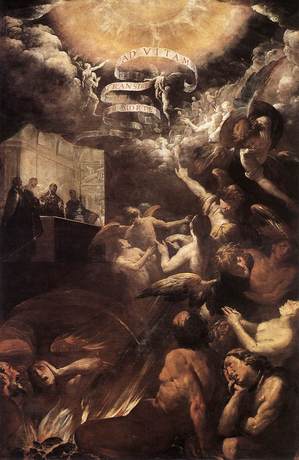 The month of November is the Month of the Holy Souls in Purgatory. I was thinking after a funeral celebrated earlier today for a friend, Jack, who died last Saturday, about my on-going responsibility for the souls in purgatory. This after being reminded that I am called, as are all the baptized, to be an echo of the encounter with Christ in this world, but also in eternal life. What I do here and now has a direct consequence in the later in the promised Destiny with the Savior.
The month of November is the Month of the Holy Souls in Purgatory. I was thinking after a funeral celebrated earlier today for a friend, Jack, who died last Saturday, about my on-going responsibility for the souls in purgatory. This after being reminded that I am called, as are all the baptized, to be an echo of the encounter with Christ in this world, but also in eternal life. What I do here and now has a direct consequence in the later in the promised Destiny with the Savior.
Is it a matter of saying the Lord’s Prayer, Hail Mary and the Glory Be with the Eternal Rest prayers around the time of a person’s death, or only on the anniversary of death of a loved one or friend? Somehow I doubt it.
The law of charity that I think Christians are called to live with certainty makes a claim on us to pray for the dead and dedicate some portion of prayer, fasting and almsgiving for the Church Suffering (the Holy Souls) so that one day they become part of the Church Triumphant. Being Friends in the Lord (disciples of Christ) can’t be indifferent to those who have died. We believe that the bonds of love don’t unravel with the death of the body. We promise the dying that we won’t forget them. If this is true, then why do we so often forget to have a Mass offered for their intentions, or say a rosary for our loved ones, or absent ourselves from visiting the cemetery? Mass, the rosary and a visit are concrete acts of love that have a real consequence for real people we knew and loved in this life.
Consider the image of posted above is a example of spiritual works effecting the soul of another. Here the Baroque Master Giovanni Battista Crespi, “Il Cerano” (1573-1632) paints in 1617 Saint Gregory the Great “delivering the soul of a monk.” The deliverance is the result of the monk and pope Gregory offering Mass for the soul of a monk. The depths of mercy and love are mined by the devotion of the Mass for another.
What does the Church teach about Purgatory?
In the Catechism of the Catholic Church states:
Paragraph 1030: All who die in God’s grace and friendship, but still imperfectly purified, are indeed assured of their eternal salvation; but after death they undergo purification, so as to achieve the holiness necessary to enter the joy of heaven.
Paragraph 1031: The Church gives the name Purgatory to this final purification of the elect, which is entirely different from the punishment of the damned. The Church formulated her doctrine of faith on Purgatory especially at the Councils of Florence and Trent. The tradition of the Church, by reference to certain texts of Scripture, speaks of cleansing fire. As for certain lesser faults, we must believe that, before the Final Judgment, there is a purifying fire. He who is truth says that whoever utters blasphemy against the Holy Spirit will be pardoned neither in this age nor in the age to come. From this sentence we understand that certain offenses can be forgiven in this age but certain others in the age to come.
Paragraph 1472 excerpted: This purification frees one from what is called the “temporal punishment” of sin.
For more on purgatory you can read here.
The Holy Souls in Purgatory. Purgatory has been described, as a “cleansing fire” that burns away the dross of sins on our souls. Saint Paul wrote those of being saved “yet so as through fire” and whether or not the soul endures a literal fire, its purification does involve suffering. The time each soul spends there, and the severity of the pains it experiences, varies. However, our prayers for these souls can help alleviate their sufferings and help them reach heaven more quickly. Although they can no longer pray for themselves, they can and do pray for us as well out of gratitude! In addition we can help them by having masses said for the departed and by engaging in works of cha
rity and sacrifice on their behalf.